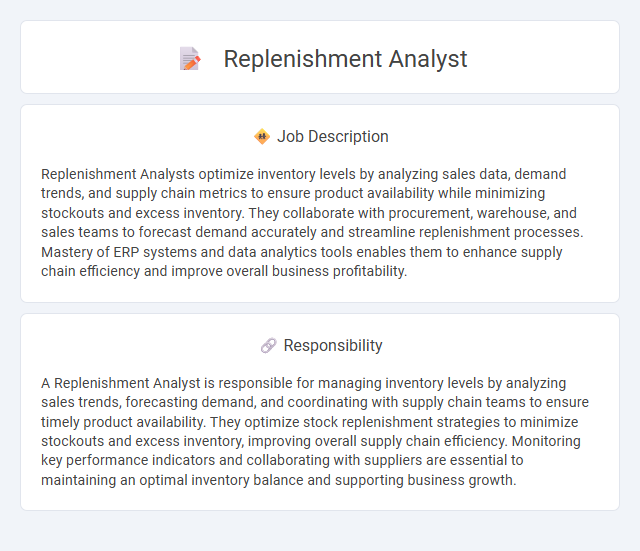
Replenishment Analysts optimize inventory levels by analyzing sales data, demand trends, and supply chain metrics to ensure product availability while minimizing stockouts and excess inventory. They collaborate with procurement, warehouse, and sales teams to forecast demand accurately and streamline replenishment processes. Mastery of ERP systems and data analytics tools enables them to enhance supply chain efficiency and improve overall business profitability.
Individuals with strong analytical skills and a detail-oriented mindset are likely to be well-suited for a Replenishment Analyst role. Those who thrive in environments requiring constant data evaluation and inventory forecasting may find this position aligns with their capabilities. However, candidates who prefer less structured or quantitative tasks might struggle to adapt to the demands of this job.
Qualification
A Replenishment Analyst typically requires strong analytical skills and proficiency in inventory management software such as SAP or Oracle. Expertise in demand forecasting, supply chain optimization, and statistical analysis is essential to ensure efficient stock levels and minimize shortages. Strong communication skills and the ability to collaborate with procurement, logistics, and sales teams are critical for successful inventory replenishment strategies.
Responsibility
A Replenishment Analyst is responsible for managing inventory levels by analyzing sales trends, forecasting demand, and coordinating with supply chain teams to ensure timely product availability. They optimize stock replenishment strategies to minimize stockouts and excess inventory, improving overall supply chain efficiency. Monitoring key performance indicators and collaborating with suppliers are essential to maintaining an optimal inventory balance and supporting business growth.
Benefit
A Replenishment Analyst role likely offers significant benefits such as improved inventory accuracy and optimized stock levels, reducing holding costs and minimizing stockouts. Enhanced data analysis skills developed on the job could increase career advancement opportunities within supply chain management. The position probably supports collaboration across departments, fostering a strategic understanding of demand planning and logistics operations.
Challenge
Replenishment Analyst roles likely involve the challenge of accurately forecasting inventory needs to prevent stockouts or overstock situations. Managing large datasets and integrating real-time market trends could pose ongoing difficulties in maintaining optimal supply chain balance. The role probably demands continuous adaptation to fluctuating consumer demand and supplier inconsistencies to sustain efficient replenishment cycles.
Career Advancement
A Replenishment Analyst plays a critical role in optimizing inventory levels and supply chain efficiency, directly impacting a company's profitability. Mastery of data analytics tools and forecasting techniques can lead to advanced positions such as Supply Chain Manager, Inventory Control Specialist, or Demand Planning Lead. Continuous skill development in areas like ERP systems, market trend analysis, and cross-functional collaboration accelerates career growth opportunities within logistics and operations management.
 kuljobs.com
kuljobs.com